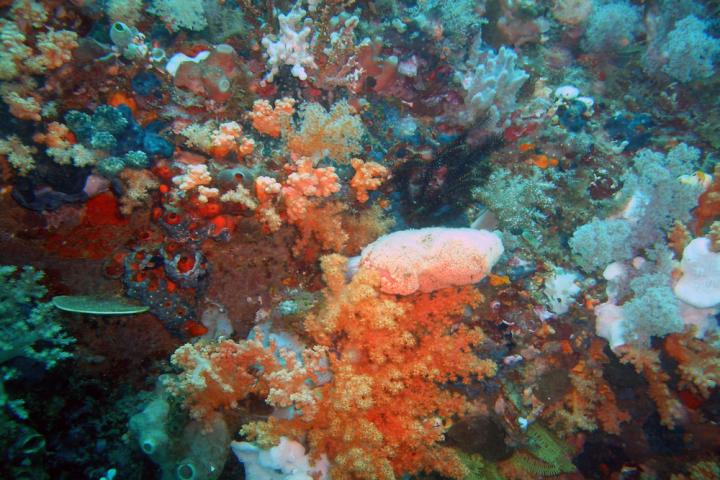The natural product manzamine A, derived from Indo-Pacific marine sponges, exhibits anti-cancer properties in a preclinical study, report researchers at the Medical University of South Carolina

Credit: Samuel Chow. This file is licensed under the Creative Commons Attribution 2.0 Generic license.
A sponge found in Manado Bay, Indonesia, makes a molecule called manzamine A, which stops the growth of cervical cancer cells, according to a recent publication in the Journal of Natural Products submitted by researchers at the Medical University of South Carolina (MUSC) and their collaborators. Collaborators include students and investigators at the University of South Carolina (UofSC), College of Charleston, Gadjah Mada University in Indonesia and the University of Malaya in Malaysia.
The American Cancer Society estimates that there will be 13,800 new diagnoses of cervical cancer and 4,290 deaths in 2020. Though Pap tests and HPV vaccination have decreased the number of cervical cancer deaths, cervical cancer remains the fourth most common cancer in women.
The MUSC-UofSC study examined the anti-growth and cancer cell-killing effects of manzamine A in four different cervical cancer cell lines. Manzamine A stopped cervical cancer cells from growing and caused some cells to die but did not have the same effects on normal noncancerous cells.
“This is a highly exciting new application for a molecule that has earlier shown significant potential for the control of malaria and has good drug-like properties,” said Mark T. Hamann, Ph.D., the SmartState Charles and Carol Cooper Endowed Chair in Pharmacy and professor in the Department of Drug Discovery and Biomedical Sciences at MUSC. Hamann also serves as the co-senior author of the report.
“Natural products have led to the development of most of our antibiotics and anti-cancer therapies and many controls for pain,” explained Hamann.
The study’s other co-senior author, Dev Karan, Ph.D., was formerly an associate professor at UofSC before moving to the Medical College of Wisconsin, where he is an associate professor in the Department of Pathology.
In earlier work, Hamann’s group identified sponge-derived compounds effective against melanoma as well as prostate and pancreatic cancers. Manzamine A is also effective against the parasite responsible for malaria, leading to a single-dose cure in rodents. Some analogs of this unique class of drugs are candidates for the control of COVID-19, the disease caused by the new coronavirus.
In the current report, manzamine A reduced expression levels of a protein known to be highly expressed in a number of cancers, including cervical cancer, and to contribute to poorer patient outcomes.
Computer modeling showed that manzamine A shares similar structures with known inhibitors of the protein, yet manzamine A is 10 times more potent in blocking the problematic proteins.
Several patents have been filed on manzamine A, and a startup company is in the works.
Next steps are to establish its clinical relevance, according to Hamann.
“The goal now is to make sure that it works in animals and then try to advance it into clinical applications and further development,” said Hamann.
While these molecules can be synthesized in the laboratory, Hamann doesn’t think that’s the best process.
“Most of the starting materials for lab-based synthesis are derived from petroleum,” he explained. “In contrast, sponges in their natural habitat can be successfully farmed, and unlike other forms of aquaculture, clean the environment.”
Therefore, production of these molecules from sponges growing in the environment would likely be the best source while providing opportunities for economic development in rural Indonesia.
However, the potential to find new therapeutic uses like this one for natural products hinges on species diversity, according to Hamann.
“The preservation of species diversity is extremely important, as is the diversity of the chemicals they produce and the opportunities for treating cancer that they offer,” explained Hamann. “If 50 years of climate change remains unchecked, projections are that we may lose one-third of the global species diversity. So with that will go opportunities like this.”
###
About the Medical University of South Carolina
Founded in 1824 in Charleston, MUSC is the oldest medical school in the South as well as the state’s only integrated academic health sciences center with a unique charge to serve the state through education, research and patient care. Each year, MUSC educates and trains more than 3,000 students and 800 residents in six colleges: Dental Medicine, Graduate Studies, Health Professions, Medicine, Nursing and Pharmacy. The state’s leader in obtaining biomedical research funds, in fiscal year 2019, MUSC set a new high, bringing in more than $284 million. For information on academic programs, visit http://musc.
As the clinical health system of the Medical University of South Carolina, MUSC Health is dedicated to delivering the highest quality patient care available while training generations of competent, compassionate health care providers to serve the people of South Carolina and beyond. Comprising some 1,600 beds, more than 100 outreach sites, the MUSC College of Medicine, the physicians’ practice plan and nearly 275 telehealth locations, MUSC Health owns and operates eight hospitals situated in Charleston, Chester, Florence, Lancaster and Marion counties. In 2019, for the fifth consecutive year, U.S. News & World Report named MUSC Health the No. 1 hospital in South Carolina. To learn more about clinical patient services, visit http://muschealth.
MUSC and its affiliates have collective annual budgets of $3.2 billion. The more than 17,000 MUSC team members include world-class faculty, physicians, specialty providers and scientists who deliver groundbreaking education, research, technology and patient care.
Media Contact
Heather Woolwine
[email protected]
Original Source
https:/
Related Journal Article
http://dx.




